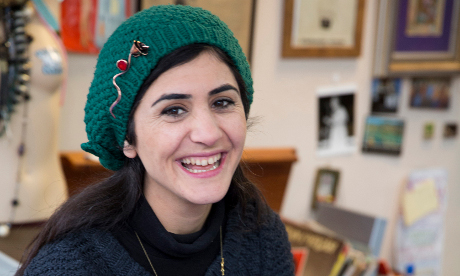Çiğdem Aslan sings the blues of the Mediterranean

Singer Çiğdem Aslan. Photograph: Eleonore de Bonneval
On a corner of Stoke Newington High Street one shop nearly always catches the eye, its window decked with old pictures, musical instruments, vintage clothes and brightly-coloured jewellery from past eras.
The shop is called Flying Goats, co-run by a Turkish singer whose day job working with these elegant history-laden objects is reflected in the music she creates.
Çiğdem Aslan, 30, released Mortissa last autumn, a collection of rebetiko songs that was named as an album of the year in the world music magazine Songlines.
Rebetiko is a music originally sung in the cafés, prisons and hash dens of cities such as Istanbul, Piraeus and Thessaloniki in the 1920s and 30s after the governments of Greece and Turkey agreed on the mandatory exchange of the Greek Orthodox citizens of Turkey and Muslim citizens of Greece.
“It’s the music that was born in Anatolia and then evolved in Athens after the population exchange,” Aslan says. “It’s the music of the underground and is also referred to as Mediterranean blues. It’s simple yet very deep about all sorts of things that we can find in life.”
The songs, sung in Turkish and Greek, tell stories of young women longing to escape the veil, Robin Hood-like heroes and cooks who believe they make the best köfte in town. One song tells the story of two friends who try to get rich selling ‘leeks’.
“It’s a metaphor for selling drugs”, says Aslan. “It reflects a reality from that time because when people came from Anatolia they didn’t have jobs or anything so they had to do illegal things to earn their living.”
Most of the songs on the album are from a particular strain of rebetiko sung mainly by women, and the album’s title refers to a woman who apparently enjoys drinking, smoking, singing, dancing and being around men. “The word means ‘death bearer'”, Aslan says. “She’s a woman of an independent character who likes having fun.”
Aslan started her singing career in Istanbul ten years ago before she decided to come to London to study English Literature. Her studies took a back seat after she started performing again, first with Walthamstow-based Balkan band Dunav (established in 1964), and then as a member of the highly-rated She’koyokh Klezmer Ensemble.
“Living in East London has contributed a lot to my music,” she says. “Here you can meet all sorts of people. For someone like me who sings a lot of different songs in different languages it’s like heaven because there are so many great musicians and musicians from all over the Balkans.”
